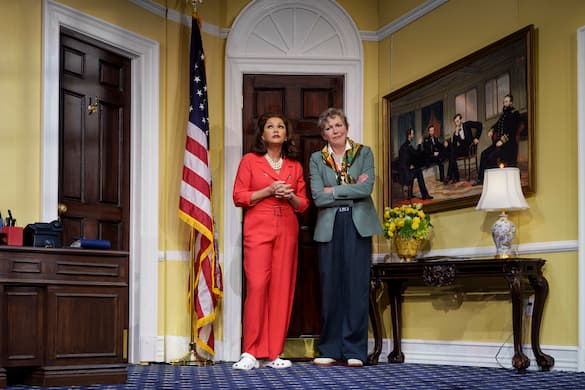Susan Stroman for President? ‘POTUS’ Proves Again She Really Runs the Show
The sly wit and inspired goofiness of this staging owes much to the unique imagination she has brought even to lesser musicals, such as adaptations of ‘Young Frankenstein’ and ‘Bullets Over Broadway.’

Sometimes all it takes to get a play off the ground is a musical comedy genius.
The promisingly titled “POTUS: Or, Behind Every Great Dumbass are Seven Women Trying to Keep Him Alive” marks the Broadway debut of the young playwright and screenwriter Selina Fillinger, a contributor to Apple TV’s “The Morning Show.” It also heralds the return of director and choreographer Susan Stroman, whose flair for finding hilarity and poignance in physical and visual expression has benefited original productions and revivals of shows such as “Contact,” “The Music Man,” and, most famously, “The Producers.”
There are directors without Ms. Stroman’s musical theater pedigree who could, I’m sure, have made hay with Ms. Fillinger’s boisterous, potty-mouthed farce, which follows a group of gals with various connections to an unseen but clearly incompetent commander-in-chief. Yet the sly wit and inspired goofiness of this staging owes much to the unique imagination Ms. Stroman has brought even to lesser musicals, such as adaptations of “Young Frankenstein” and “Bullets Over Broadway.”
“POTUS” itself requires some heavy lifting, for both the director and her expertly assembled cast, which includes Julie White as the president’s chief of staff, Suzy Nakamura as his press secretary, and Vanessa Williams as the first lady. This is especially true in the first act, in which the women react with assorted levels of agitation to a series of developing crises, among them a particularly egregious profanity uttered by the president and a mysterious pustule that has made it impossible for him to sit down.
Seemingly no naughty word is spared and no body part or bodily fluid unmentioned in the short scenes that follow. Even for unapologetic fans of blue humor, and I consider myself one, the material loses its bite after a while, and you sense how hard the actors are pushing to sell it. Ms. Fillinger also segues into dry social commentary, not all of it specifically feminist in nature; in one scene, a White House reporter played by Lilli Cooper questions Ms. Williams’s character about her devotion to racial justice.
Then, just before intermission, there’s a plot twist that allows Ms. Fillinger to find her groove and Ms. Stroman to put the full force of her creativity into effect. A heavy object flies across the stage, in ominous and hilarious slow motion, paving the way for a second act that enlists an array of props and gags — and a song and dance routine, at one point — as the women frantically try to maneuver their way out of a very big pickle.
The performers, all game from the get-go, blossom like flowers. Ms. White, who spends much of Act One shouting so hoarsely that I worried she might need vocal surgery within a few weeks, conveys her character’s shock and exhaustion with impeccable wryness. Ms. Williams brings the first lady’s imperious guard down, and Ms. Cooper applies the earthy wit she has brought to musical productions as the reporter.
Ms. Nakamura’s even more tightly wound press secretary also unravels winningly, especially in the presence of the president’s sister, whom she introduces as “an international drug mule” — “I prefer drug stallion,” the sister counters — played with typical comic gusto by the inimitable Lea DeLaria. And Julianne Hough turns up as a sweet young thing with an explosive secret that she doesn’t manage to keep for long.
Ms. Hough’s dancing chops are showcased in the previously mentioned musical number, in which her partner is another comedic veteran who threatens to steal the show more than once. Rachel Dratch has an advantage in that her character, the president’s personal secretary, spends about half the show in a heavily altered state. Regardless, she makes the most of this gift — with Ms. Stroman’s enthusiastic support, of course.
The idea that at least a few of these fictional women could do a better job leading a country than the title character comes up repeatedly in “POTUS,” and Ms. Fillinger makes a case for this while also making us shudder at the thought. Ms. Stroman, meanwhile, proves once again that her own leadership abilities should be held in no doubt.

